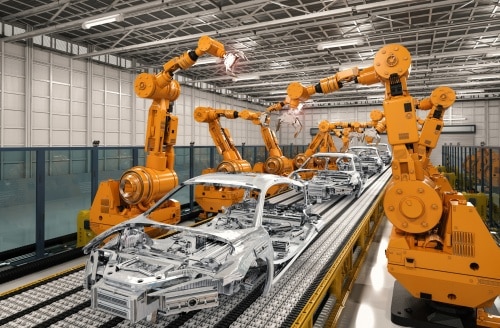The rapidly falling price of robots is speeding up the shift towards lights-out manufacturing, where factories are fully-automated in a lights-out environment with minimal human intervention to run day-to-day operations.
According to a recent analysis by Frost & Sullivan, companies have an opportunity to optimise their human capital and potentially save up to 20% of labour costs and generate a 30% increase in productivity output by switching to a lights-out operations model.
In addition, they can achieve their sustainability and zero-carbon emission goals by saving energy during production hours. Automotive, general manufacturing, electronics and electrical components, and logistics and warehousing are four major industries expected to make rapid advancements toward a fully automated lights-out environment in the short term.
"Globally, the COVID-19 outbreak has further expedited the shift to automated lights-out manufacturing processes. This enables companies to expand their production capacity beyond traditional shift hours and take on additional work orders to ramp up productivity to pre-COVID-19 levels," said Vinay Venkatesan, program manager, TechVision at Frost & Sullivan.
Venkatesan pointed out artificial intelligence (AI) will be the most critical tool enabling the lights-out toolkit.
“It will fuel several key technologies such as robotics, cybersecurity, digital twins, generative design, cloud computing, 5G, and 3D printing, all of which will play a key role in achieving lights-out operations,” he said.
Meanwhile with a long-term vision, a digital-first approach, and a highly skilled human workforce, a lights-out manufacturing process can unlock several opportunities, including:
- Rise of micro-factories: The shift toward decentralized structures and automated manufacturing processes will drive the demand for microfactories that require a smaller workforce and less space, energy and materials.
- Grid manufacturing: Cyber-physical systems and computational advancements driving intelligent automation will allow companies to achieve mass customization by adopting operational customisation as a business strategy.
- Manufacturing-to-zero-as-a-service: Enabling manufacturing optimization with a zero-based value proposition requires an integrated approach that leverages all core "zero" technologies.
- Industrial Internet of Things (IIoT) platform: Ensuring a seamless transfer of information among interconnected stakeholders is important to build a collectively intelligent IIoT platform.
Venkatesan said the manufacturing industry will increasingly rely upon an ecosystem of technology experts, system integrators, and service enablers to achieve agility and customisation.
“In fact, more than 45% of manufacturing applications are expected to implement robotics-as-a-service (RaaS) by 2030,” he said.



